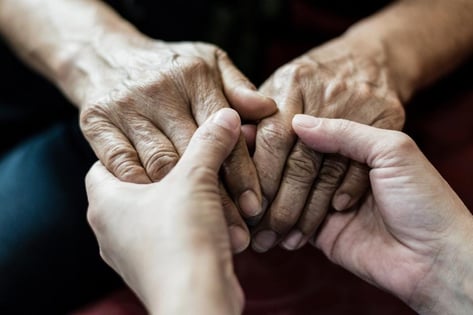There are various tools, strategies, and resources can help first-time family caregivers begin the conversation with the person they are providing compassionate care for about the next steps in their life journey, such as hospice. Using outside resources to understand conditions like caregiver burnout and emotional fatigue can help people understand their limits and their loved ones' obstacles. The end-of-life process requires a team to ensure that patients' desires are fulfilled before and after they pass.
In this blog, the Gulfside team will discuss how you can begin the conversation about hospice care with a member of your family, as well as share a few tips for how to communicate effectively about the end of life journey without causing stress, burnout, or confusion.
Step 1: Removing the Stigma Of Receiving Hospice Care
Often times when the word hospice is mentioned people associate it with the last phase of life, and while hospice care is compassionate care for those nearing the end of their life, in 2017 NPR reported that nearly 1 in 5 patients have been discharged from hospice before he or she dies. The National Hospice and Palliative Care Association also reported that 17.4 percent of all Medicare beneficiaries using hospice were discharged alive in 2019. Both of these statistics support the notion that hospice care is not an end to life, but the beginning of a new phase. Using this narrative when talking to a loved one can be helpful, because it removes some of the stress, guilt, and denial that surrounds the act of dying.
If your loved one doesn’t believe that hospice care is the right decision for them, consider mentioning palliative care to them instead. Palliative care is similar to hospice, except it can occur at any stage of the diagnosis and this form of care can help with the transition to hospice care later on. You can read more about beginning the conversation about palliative care here.

Step 2: Identifying The Needs Of Yourself & Your Loved One
After taking time to understand your feelings and identifying any challenges that you might encounter while planning for the future with the person you care for, sit down and create a list of conversation openers that allow for your loved one to feel welcome and included in any decisions being made.
Some conversation starters could include:
- “The last hospital visit seemed hard on you – let’s discuss some alternatives to prevent future visits and find some services that can be done from home”
- “You don’t have to be in pain anymore. They’re experts in pain management and caring for people with this illness."
- “The care team at this facility can help remove some of the stress you are feeling and you wouldn’t have to be alone”
- “There are different specialists and counselors at this facility that can help you, and the family, better understand your recent diagnosis."

Step 3: Making A Care Decision & Receiving Compassionate Care
After having a conversation with your loved one about the kind of care they would like to receive, it is time to discuss where they would like to receive said care. Companies like Gulfside Healthcare Services strive to provide compassionate care wherever a patient calls home – which means that care does not have to begin in an in-patient facility, but some services can start in the family’s home. When you decide to contact our care team on behalf of your loved one, you will be able to discuss the different options and services for care. Members of the care team will work with you and your loved one to ensure that the care decision you make together is the one that results in compassionate care for all parties involved.
During this phase of planning, you can utilize tools like the Five Wishes pamphlet to help the person you care for create a living will that outlines how they would like to receive care and their end-of-life wishes. This pamphlet also aids the care team in ensuring that there are no miscommunications during the care process and removes some of the stress from your plate because it can act as a legal document in most states.
You can learn more about more about the hospice and non-hospice services offered by Gulfside here, or even request a free consultation with our team to discuss your options. Gulfside also has several caregiver resources available to assist you as you begin planning to have the conversation about hospice care with your loved one. You can contact our team for more information about caregiver support services here.






